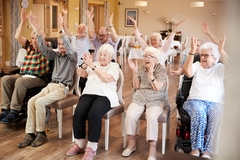
Someone who suffers from Alzheimer’s may experience a withdrawal from things which were once important to them. Such things include hobbies, activities, sports, social activities, events, and friends.
Alzheimer’s, the most common cause of dementia, is a progressive disease which causes brain cells to degenerate and die. This in turn, causes a decline in thought, behavioral skills, social skills, memory and a person’s ability to function independently.
Partaking in hobbies and social interactions can lead to happiness and make people feel valued. When a person battling dementia spends too much time alone or not participating in regular hobbies or activities, they can feel lonely which could increase their risk for depression, anxiety, agitation, and anger.
The most stimulating and engaging activities for someone with Alzheimer’s can be different for each individual, but here are six important ways that seniors with Alzheimer’s can stay active:
Music
Singing, dancing, playing or listening to music is a great stimulator. Music provokes positive emotions and light movement such as dancing. Playing instruments can also help keep seniors engaged in activity.
According to umh.org, a study by University of Miami School of Medicine discovered that music leads to increased levels of “feel-good” brain chemicals in Alzheimer patients. (https://www.umh.org/assisted-independent-living-blog/the-benefits-of-music-for-seniors-with-alzheimers-and-dementia)
Arts & crafts
There are many adult-friendly crafts for your creative loved one. Adult coloring books, painting/drawing, knitting/crocheting, and creating collages from picture books or magazines are all examples of small crafts that can help keep your elderly loved one engaged in their interests and promote relaxation.
Games
Keeping the mind active with a card game, puzzle, or board game can benefit both the caregiver and your loved one. Simple games such go-fish, checkers, or small puzzles are all examples which can spark joy, activate, and engage the mind. Since these games are typically done with a partner or in a group, games can also help with socialization and lessen feelings of loneliness or depression.
Exercise
Light exercise such as taking a walk outdoors or even walking around inside have major health benefits. Other forms of exercise might include attending a dance or group fitness class for the elderly or even golfing or bowling. There are also exercise programs for Alzheimer’s patients to help with cognitive functions, social skills, and behavioral abilities.
Activities around the home
Your loved one may feel most comfortable in their own home and doing small chores around the house. These activities could be as easy as organizing or cleaning their home or room.
Looking through memorabilia
Reminiscing on the good old times with friends and family is a great way for an elderly loved one with Alzheimer’s to activate their mind and keep their spirits up. Looking through old photo albums, books, clothing, old songs, and videos are just a few ideas. Maybe even creating a scrapbook of favorite memories with your loved one can be a good activity to cherish together.
There are a number of ways to keep seniors diagnosed with Alzheimer’s active and their mind and body engaged as they go through memory and behavior changes. These activities can be simple, low stress, and entertaining for your loved one.
It is important to remember your loved one may have some difficulty with activities, which once came naturally to them, as the disease progresses. It is important to help them through things when they get frustrated rather than focus on results.